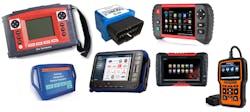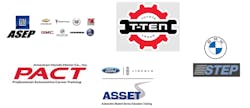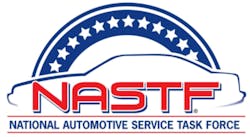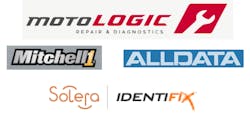Should your auto repair shop focus on one make or all makes and models?
Content brought to you by Motor Age. To subscribe, click here.
This article has been updated from its original July 26, 2021 publication.
What You Will Learn:
• Set attainable goals to ensure success
• Find you weaknesses and address them
• Set yourself up for success by ensuring you have the right tools, knowledge, and adequate service information available
I believe the age-old question will always surface. “Should my automotive facility specialize in a particular make, or should we be open to address all vehicles?” Honestly, I’m not a shop owner. Nor am I a shop manager or even a business coach. So, to speak with absolute certainty is not something I can offer you. However, being a technician for more than 20 years and having worked with many teams in numerous shops all around the country, I can offer you my input and maybe help you decide what might be best for you and your shop.
The “dealership" mentality
As stated above, I began my career in 1999, right out of high school. My first formal automotive education began with General Motors’ Automotive Service Educational Program (GM ASEP program). Over the course of two years, my time was divided into eight-week periods, alternating each period at both an Oldsmobile dealership and the ASEP program, held at Northampton County Community college in Bethlehem, Pennsylvania. I mention this because I was very green and lacked the commonsense as well as the know-how, we all survive on.
What the program did for me was not only introduce me to basic skills but also the fundamentals that are required to safely maintain, service and repair GM vehicles. The course was divided into training modules covering all aspects of the vehicle including:
- Engine repair
- Engine performance
- Manual transmission and transaxle/drivetrain
- Automatic transmission
- Steering/suspension
- Brakes
- HVAC
- Specialized electronics training
- Customer rapport
My time in GM ASEP training brought me up to speed relatively quickly. I was by no means an expert, but the program worked well. I was a specialist for GM vehicles. Over time and within the two years at school, I became very familiar with how GM did things” What I mean by that is the program taught me how the engineers designed the vehicles, the sub-systems and how the individual components functioned. I could then anticipate how the systems were to function. Of course, I still required the same service information we all rely upon presently, but I was confident when approaching a GM vehicle for basic maintenance, service or repair. Having this confidence, the proper information and the correct tools to do my job, I was finding myself becoming a much better technician as each week came to pass. Again, the program worked!
In a short amount of time, I developed a higher level of comfort working on the same vehicles repeatedly. This gave me that familiarity we all crave so that we can work more efficiently. I found myself exceeding 100 percent productivity in a relatively short amount of time. This, too, gave me confidence.
Being familiar with how the vehicles were configured, how they were assembled and how they came apart, I could then focus my energy on becoming a better diagnostician. I started to stare at wiring diagrams and HVAC vacuum diagrams. I realized that many of these systems were configured very similarly, which meant to me that I could spend the time to master these configurations and invest in some necessary tooling because it could be applied to almost everything I would be working on, and my return on investment would be realized very quickly. Don’t believe me that this type of program works? Keep reading!
Third time is the charm
An opportunity had risen for me at our Saturn dealership. They were in need of a service technician. I was nervous about the transition as I feared I’d have to start all over again. Well, that fear wasn’t entirely realized but many things were different in Saturn’s world back then (prior to GM’s ownership).
The vehicles were not configured like the ones I was used to. This slowed my process somewhat but nonetheless, I persevered and in less than a year I was keeping pace with the veteran Saturn technicians. At that point I was permitted to go to Saturn school in Spring Hill, Tennessee and get certified. This worked out very well for me. As with my previous education for GM vehicles, this Saturn education made me an absolute specialist and I became extremely familiar with everything about the vehicles (from fluid specs to torque specs, etc.).
A few years had passed, and I had the opportunity to broaden my horizons once again; this time with Honda. Following true to form, I repeated this process for the third time and in less than a year, I was 100 percent certified as a Master Honda Technician. In fact, I became so proficient with the Hondas, I was known as an information specialist among my peers and some of the Honda Technical Instructors urged me to strive for the position as a Honda Super-Tech (Only a handful of these problem-solvers are spread throughout the country).
The point to all of this was not an attempt at dazzling anyone. It was simply to point out that a structured learning environment based around a specific set of vehicles allowed me to become comfortable, confident, knowledgeable, efficient, clever and probably most important to shop owners, profitable. Specializing in certain makes streamlines a technician’s approach because of the familiarity involved. He or she spends less time researching because of this familiarity. The information simply becomes engrained in their minds. Past experiences can be recalled to aid in future encounters with other vehicles which drastically reduces the applied time, in most scenarios.
When it comes to tooling, the costs can be minimized somewhat compared to the average full-service independent shop. The information systems, the basic tooling, the specialized tooling (including scan tools/subscriptions to OE information and software) is not exactly cheap. But rest assured that if the market in your area supports a specific make or a few specific makes, the potential for a booming business is definitely there. Especially if you take similar steps to what I did above. Making a name for yourself or your facility as a “specialist” who is great at what they do goes a very long way.
A trip to the “independent world”
After about 10 years with Honda, I chose to move on to greener pastures. It wasn’t because I wasn’t happy with where I worked or whom I worked with. It was simply because I needed a new challenge.
What I learned very quickly when I entered the world of the independent automotive shop was that I really didn’t know much at all. It was a real kick in the pants to truly believe I was good at fixing cars, only to find out that I was simply good at fixing Hondas. This is the point in my career that I truly realized a goal can be carried out many, many different ways. This was very difficult for me to grasp.
For the first time in a very long time, I spent most of my time with my nose buried in service information. Every car that came through my work bay required a lot of reading from me. I simply had no familiarity, and it was my downfall. I wasn’t familiar with the vehicles’ layout, the differences in how the systems could be configured, the special tools needed to perform certain tasks and even learning to navigate the many different service information systems we had at our disposal. I realized that I was good at working with Hondas because I had everything virtually memorized. I wasn’t relaying on service information because it was all in my head (well, most of it).
Next came the tooling. Everything from Tamper-proof Torx sockets to tie-rod wrenches. I owned none of this stuff! I didn’t need it in the past, not once. I found myself borrowing tools each day of each week and when the tool truck arrived, I’d be spending hundreds of dollars just to get myself the tools I needed to do my everyday job. No longer could I rely on my Honda HDS OE scan tool. I needed a scan tool that would communicate with most vehicles’ nodes. It was more money than I was comfortable spending at the time, but it was an absolute necessity. Again, this was very difficult for me to accept.
This is the downside to specializing in one make. The tools required to safely and accurately maintain, service and repair those vehicles may be virtually un applicable to any of the other vehicles the shop has chosen to pass up. This can be costly on many different levels. But in my position, had it not been for the other technicians loaning me the necessary tools, I’d be out of luck until the tool truck showed up.
But as time went by, I acquired quite an abundance of tools. This allowed me to continue my quest to be proficient on anything that comes through the door. I found myself seeking out training because I no longer had the dealership to pay my way. Learning in this new structure was also very different for me. Being in class with all of these successful and experienced technicians was a bit intimidating, but it didn’t stop me. I was determined to be the best technician that I could possibly be.
I soon found myself on a totally different path of learning. Up to this point, my entire career was spent learning at the factory level (OE training). We focused heavily on the system’s components and how the components worked together to accomplish a goal. Once you had that, you were educated and ready to go. But that’s not how I train any longer. I focus more now on the physics.
Realizing that there is more than one way to carry out a goal, I also realize that systems can be configured many different ways. So, I choose to focus on the components that are common to most of the vehicles. I become familiar with them individually, how they operate and how to determine their functionality with tools I use and the tests I perform. Interpreting the test results and how those results relate to the physics involved — that is the secret to my success nowadays. And it’s completely different from the type of learning carried out at the dealership level.
Is specializing right for your shop?
To sum it all up, there is a lot to consider, and again, I’m no expert in shop management. I believe common sense will tell you that the market in your locale will dictate whether certain makes can be specialized in. For instance, I’d have a heck of a time making ends meet if I chose to open up a shop in my locale boasting a specialty in Ferrari. The market simply wouldn’t support it. In fact, I can count on one hand (with fingers to spare) how many of them I’ve ever seen in my locale.
However, if I chose to run a specialty shop, it would certainly feature Honda/Toyota. I see dozens of them each day. They are fairly simple to address, and OE level diagnostic tooling is very affordable. I believe I would be very profitable with the right business plan in place and proper shop management skills adapted.
The skillset to maintain, service, diagnose and repair vehicles will typically vary from the OE level technician to the independent shop technician. The skills possessed by the advanced independent shop diagnostician are typically called upon more frequently than those possessed by the most talented OE level diagnostic specialists. Why, because that elite skill level is rarely called upon in the dealership atmosphere. In many cases, the same failures are seen many times over and the OE level diagnostician has those previous encounters to help drive the analysis more efficiently to come to a diagnosis. It’s just the nature of seeing the same vehicles over and over again. The symptoms, the failures and the repairs tend to become repetitive.
However, those skills are required daily (often multiple times per day) for the most skilled independent shop diagnosticians. It’s the deeper level of understanding that is required by these independent shop techs so that they can do their job each day, addressing many different makes and models. They are required to be a bit more clever as they are forced to think outside of the box more often than those at the dealership. It’s not a matter of talent. It’s simply a matter of consistent change and adaptation to multiple systems, tools and diagnostic techniques.
My advice? Kick around some of those ideas for a while and consult with someone in the know (like a business coach). Ultimately, I’ve seen many specialty shops not only become very successfully financially but the reputation for excellence in their facilities keeps the work bays full. On the flip side, I know shops all across the world that do just fine focusing their businesses on providing solutions to a huge variety of makes and models. In either case, do it right and shoot for the stars, I promise you it’s not very crowded up there!
About the Author
Brandon Steckler
Technical Editor | Motor Age
Brandon began his career in Northampton County Community College in Bethlehem, Pennsylvania, where he was a student of GM’s Automotive Service Educational program. In 2001, he graduated top of his class and earned the GM Leadership award for his efforts. He later began working as a technician at a Saturn dealership in Reading, Pennsylvania, where he quickly attained Master Technician status. He later transitioned to working with Hondas, where he aggressively worked to attain another Master Technician status.
Always having a passion for a full understanding of system/component functionality, he rapidly earned a reputation for deciphering strange failures at an efficient pace and became known as an information specialist among the staff and peers at the dealership. In search of new challenges, he transitioned away from the dealership and to the independent world, where he specialized in diagnostics and driveability.
Today, he is an instructor with both Carquest Technical Institute and Worldpac Training Institute. Along with beta testing for Automotive Test Solutions, he develops curriculum/submits case studies for educational purposes. Through Steckler Automotive Technical Services, LLC., Brandon also provides telephone and live technical support, as well as private training, for technicians all across the world.
Brandon holds ASE certifications A1-A9 as well as C1 (Service Consultant). He is certified as an Advanced Level Specialist in L1 (Advanced Engine Performance), L2 (Advanced Diesel Engine Performance), L3 (Hybrid/EV Specialist), L4 (ADAS) and xEV-Level 2 (Technician electrical safety).
He contributes weekly to Facebook automotive chat groups, has authored several books and classes, and truly enjoys traveling across the globe to help other technicians attain a level of understanding that will serve them well throughout their careers.






